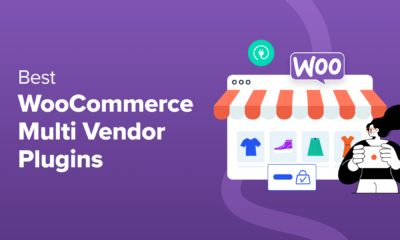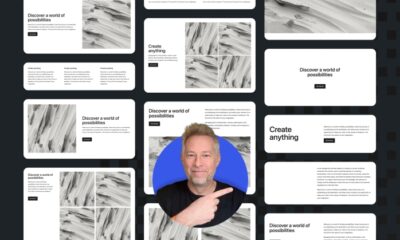SOCIAL
B.C. Premier David Eby pulls advertising from Facebook over Bill C-18
David Eby, Premier of British Columbia, speaks to media at the Council of the Federation Canadian premiers meeting at The Fort Garry Hotel in Winnipeg on July 11.JOHN WOODS/The Canadian Press
British Columbia has joined the federal government and Quebec – and dozens of Canadian companies, cities and institutions – and suspended advertising on Facebook over the tech giant’s decision to block Canadian news in response to the federal online news act.
B.C. Premier David Eby said Meta’s decision to block news from Canadians was “totally unacceptable” and the province was pulling all ads, except safety and health bulletins, from the tech giant’s Facebook and Instagram platforms. British Columbia’s government spent $1,352,000 last year on advertising on Meta, with another $138,000 so far this financial year.
The move follows Heritage Minister Pablo Rodriguez’s announcement last week that the federal government was pulling advertising from Meta platforms. Last year, Ottawa spent $11.4-million on advertising on Facebook and Instagram.
B.C. will now only publish ads related to public emergencies or public-health concerns on Facebook and Instagram, including ads about preventing and being prepared for wildfires.
Toronto Star owner pausing ads on Facebook, Instagram over Meta’s vows to block news
Mr. Eby said “many British Columbians now rely on social media to get their news. Meta’s decision to cut off that access is totally unacceptable.”
“To send a strong message to Meta that journalism is a vital public service and access to news should never be blocked, our government has decided to stop all advertising on Facebook and Instagram – with a limited exception for critical health and safety information,” the Premier added.
More than 30 advertisers, including the Quebec government, Hydro-Québec, Loto-Québec, Bell Media, Quebec-based media organizations Cogeco and Quebecor as well as the cities of Quebec and Montreal, have now suspended ads on Meta platforms.
Paul Deegan, president and CEO of News Media Canada, which represents the news industry, predicted the boycott would escalate and said Meta could lose more from advertising in Canada than the extra it would have to pay publishers if it were subject to the online news act.
The online news act would make Meta and Google negotiate more deals to pay news outlets in Canada for posting or linking to their work.
“We are going to reach a tipping point where the loss of revenue from a large scale advertising boycott is going to cost Meta much more than they would actually have to pay news businesses for the use of our content under the Online News Act. Meta has more than four billion reasons – their Canadian revenue – not to ‘unfriend’ a lucrative G7 market like Canada,” Mr. Deegan said.
“Institutional investors, like CPP Investments and the Ontario Teachers’ Pension Plan should be asking the CEOs of our financial institutions, telcos, retailers, why they haven’t joined Quebecor, Cogeco, Bell Media, and Hydro Quebec in halting advertising with Meta.”
Mr. Rodriguez expressed thanks to those who had followed Ottawa’s example and decided to suspend ads from Meta.
“The list is getting longer and it’s an important message we’re sending to the tech giants. I’d like to thank Quebec, British Columbia, the many cities, news organizations, and businesses who have followed our lead. We’ll see if more join us,” the minister told The Globe and Mail. “It’s up to them to decide for themselves. Canada is standing up to Facebook for the right reasons. A free and independent press is fundamental to our democracy.”
He added: “How much money is Facebook going to spend modifying their platforms at the expense of their users, and losing ad revenue, instead of just paying their fair share?”
Ottawa’s bid to bring Facebook onside on Bill C-18 not enough to stop it blocking news
The online news act, also known as Bill C-18, received royal assent last month. It was designed to support the Canadian news industry, which has seen its advertising migrate to the Big Tech platforms. Google has said it will too block searches for news in Canada in response to the bill. But it is continuing to hold talks with the government.
B.C. said it will continue advertising on Google as the tech giant’s negotiations continue.
Last week Unifor, the country’s biggest private sector union, suspended its Facebook ads and called for all provincial and municipal governments to follow Quebec and the federal government’s lead and suspend Meta ads.
Unifor’s national president Lana Payne called on governments and “major Facebook ad buyers to band together in support of Canadian journalism and give local news a fighting chance in this country.”
Andrew Addison, spokesman for the Canadian Media Producers’ Association, said it was suspending advertising on Facebook “as a point of principle.”
“The CMPA strongly supports the federal government, along with the growing number of companies that have pulled advertisements from Meta platforms, in response to their decision to block Canadians’ access to domestic news sites,” he said in a statement.
On Tuesday, Facebook said it was moving ahead with plans to withdraw access to Canadian news on its platforms in this country in response to Bill C-18. A day earlier, Mr. Rodriguez had said the government was drafting regulations on how the act would apply to tech giants, including putting a cap on how much they would have to inject into the news industry.
“Unfortunately, the regulatory process is not equipped to make changes to the fundamental features of the legislation that have always been problematic, and so we plan to comply by ending news availability in Canada in the coming weeks,” said Lisa Laventure, Meta’s spokesperson in Canada.
Writers’ Union of Canada CEO John Degen, said the “bully tactics of the big tech giants are deplorable.”
“All Canada is asking is what Australia and others have done. If you are going to play in our market you should be paying your suppliers,” he said.
SOCIAL
Snapchat Explores New Messaging Retention Feature: A Game-Changer or Risky Move?

In a recent announcement, Snapchat revealed a groundbreaking update that challenges its traditional design ethos. The platform is experimenting with an option that allows users to defy the 24-hour auto-delete rule, a feature synonymous with Snapchat’s ephemeral messaging model.
The proposed change aims to introduce a “Never delete” option in messaging retention settings, aligning Snapchat more closely with conventional messaging apps. While this move may blur Snapchat’s distinctive selling point, Snap appears convinced of its necessity.
According to Snap, the decision stems from user feedback and a commitment to innovation based on user needs. The company aims to provide greater flexibility and control over conversations, catering to the preferences of its community.
Currently undergoing trials in select markets, the new feature empowers users to adjust retention settings on a conversation-by-conversation basis. Flexibility remains paramount, with participants able to modify settings within chats and receive in-chat notifications to ensure transparency.
Snapchat underscores that the default auto-delete feature will persist, reinforcing its design philosophy centered on ephemerality. However, with the app gaining traction as a primary messaging platform, the option offers users a means to preserve longer chat histories.
The update marks a pivotal moment for Snapchat, renowned for its disappearing message premise, especially popular among younger demographics. Retaining this focus has been pivotal to Snapchat’s identity, but the shift suggests a broader strategy aimed at diversifying its user base.
This strategy may appeal particularly to older demographics, potentially extending Snapchat’s relevance as users age. By emulating features of conventional messaging platforms, Snapchat seeks to enhance its appeal and broaden its reach.
Yet, the introduction of message retention poses questions about Snapchat’s uniqueness. While addressing user demands, the risk of diluting Snapchat’s distinctiveness looms large.
As Snapchat ventures into uncharted territory, the outcome of this experiment remains uncertain. Will message retention propel Snapchat to new heights, or will it compromise the platform’s uniqueness?
Only time will tell.
SOCIAL
Catering to specific audience boosts your business, says accountant turned coach

While it is tempting to try to appeal to a broad audience, the founder of alcohol-free coaching service Just the Tonic, Sandra Parker, believes the best thing you can do for your business is focus on your niche. Here’s how she did just that.
When running a business, reaching out to as many clients as possible can be tempting. But it also risks making your marketing “too generic,” warns Sandra Parker, the founder of Just The Tonic Coaching.
“From the very start of my business, I knew exactly who I could help and who I couldn’t,” Parker told My Biggest Lessons.
Parker struggled with alcohol dependence as a young professional. Today, her business targets high-achieving individuals who face challenges similar to those she had early in her career.
“I understand their frustrations, I understand their fears, and I understand their coping mechanisms and the stories they’re telling themselves,” Parker said. “Because of that, I’m able to market very effectively, to speak in a language that they understand, and am able to reach them.”Â
“I believe that it’s really important that you know exactly who your customer or your client is, and you target them, and you resist the temptation to make your marketing too generic to try and reach everyone,” she explained.
“If you speak specifically to your target clients, you will reach them, and I believe that’s the way that you’re going to be more successful.
Watch the video for more of Sandra Parker’s biggest lessons.
SOCIAL
Instagram Tests Live-Stream Games to Enhance Engagement

Instagram’s testing out some new options to help spice up your live-streams in the app, with some live broadcasters now able to select a game that they can play with viewers in-stream.
As you can see in these example screens, posted by Ahmed Ghanem, some creators now have the option to play either “This or That”, a question and answer prompt that you can share with your viewers, or “Trivia”, to generate more engagement within your IG live-streams.
That could be a simple way to spark more conversation and interaction, which could then lead into further engagement opportunities from your live audience.
Meta’s been exploring more ways to make live-streaming a bigger consideration for IG creators, with a view to live-streams potentially catching on with more users.
That includes the gradual expansion of its “Stars” live-stream donation program, giving more creators in more regions a means to accept donations from live-stream viewers, while back in December, Instagram also added some new options to make it easier to go live using third-party tools via desktop PCs.
Live streaming has been a major shift in China, where shopping live-streams, in particular, have led to massive opportunities for streaming platforms. They haven’t caught on in the same way in Western regions, but as TikTok and YouTube look to push live-stream adoption, there is still a chance that they will become a much bigger element in future.
Which is why IG is also trying to stay in touch, and add more ways for its creators to engage via streams. Live-stream games is another element within this, which could make this a better community-building, and potentially sales-driving option.
We’ve asked Instagram for more information on this test, and we’ll update this post if/when we hear back.
-

 MARKETING6 days ago
MARKETING6 days agoEffective Communication in Business as a Crisis Management Strategy
-

 SEARCHENGINES6 days ago
SEARCHENGINES6 days agoGoogle Won’t Change The 301 Signals For Ranking & SEO
-

 SEO5 days ago
SEO5 days agobrightonSEO Live Blog
-

 PPC6 days ago
PPC6 days ago9 Ecommerce Trends to Boost Your Business in 2024
-

 SEO6 days ago
SEO6 days agoHow To Write ChatGPT Prompts To Get The Best Results
-

 SEO4 days ago
SEO4 days agoGoogle March 2024 Core Update Officially Completed A Week Ago
-
SEARCHENGINES5 days ago
Daily Search Forum Recap: April 25, 2024
-

 WORDPRESS4 days ago
WORDPRESS4 days ago9 Best WooCommerce Multi Vendor Plugins (Compared)













